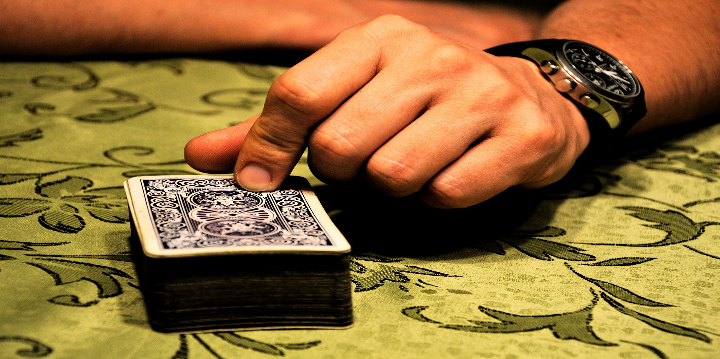Is Blackjack a Game of Chance or Skill?
Not every gambler is created equal.
Some traditional methods of gambling produce outcomes based entirely on luck. Think of a coin-flip – there’s no real skill to betting on which side of the coin will land, the end-result is random.
Other popular ways to bet involve some element of skill. You can’t strategize or luck your way into the money in an arm-wrestling competition, you have to have certain skills to succeed.
American law frequently makes a distinction between the legality of games of chance and games of skill. In many cases, games with a skill element (such as poker) are legal and regulated, while games based entirely on luck are disallowed.
How does all of this work when it comes to the game of blackjack? How has American law interpreted blackjack in the past – as a game of chance or a game of skill?
This post answers that question in detail, attempting to settle for once and for all whether blackjack is more of a luck contest or more of a skilled game between opponents.

What’s a Game of Chance?
I want to clear up some confusion – when you see the word “chance” related to gambling, think “luck.” I suppose the phrase “game of luck” doesn’t sound as cool as “game of chance,” though sometimes I’ll refer to these games as luck-based or luck games.
My desktop Merriam-Webster’s gives a satisfying definition of the phrase “game of chance,” defining it as “a game … in which luck rather than skill determines the outcome.”
My dictionary also points out that the first known use of this phrase with this definition is from 1660 – we’ve been discussing the merits of luck-based games for nearly 400 years.
Taken at face value, the above definition seems to be an open-and-shut case. Any game that depends on luck instead of skill is a game of chance, right? It’s not that easy.
At issue is the fact that lots of games involve both luck and skill. Poker players at the highest level are absolutely demonstrating skills above and beyond the average poker player, but there’s an element of luck in the distribution of cards. Should we think of poker as a game of chance, since there’s no skill involved in being dealt a good hand?
In some cases, a game’s status as a game of chance is easy to recognize. Roulette, depending as it does on the random movement of a ball across a series of numbered pockets, is clearly a game of chance. There’s no skill involved in placing a bet that turns out to be a winner. The same goes for craps, which is based on the random movements of dice, and keno, a lottery-like game where random chance is king.
Before we dig deeper into the legal status of blackjack as a game of chance or skill, I want to dig a little deeper into what makes a game a skill-based game.
What’s a Skill Game?
My handy Merriam-Webster defines a skill game as “a game where the outcome is determined mainly by mental or physical skill rather than chance.”
It’s basically the opposite of the game of chance definition from above.
In the case of blackjack, we’re not talking about physical skill. The skill element in blackjack is in the making of decisions – not in how much to bet, but in whether to fold, split, double, take a hit, etc. Good blackjack players know how to increase their likelihood of winning by making the best decisions – the element of luck in the initial deal means little compared to the impact of a player following optimal blackjack strategy.
The distinction between a game of chance and a game of skill is extremely important in some jurisdictions. In New York, a single judge’s ruling that poker is primarily a game of skill has paved the way for increased access to legal poker play in the state. Alternatively, German authorities have declared poker to be primarily based on a chance element (the card distribution thing again) and have banned its play outside of casinos.
Now that we’ve defined some important words in the “is blackjack a game of chance” controversy, I want to look in detail at the luck and skill elements of the game, to try to come to some conclusion on whether blackjack is a luck-based game or not.
The Luck Element in Blackjack
I don’t want to make it sound like people who have skills at blackjack win frequently and make tons of money off the casinos. That’s not the case. A player can memorize optimal blackjack strategy and make zero mistakes and still lose more than the drunk guy at the next seat barely paying attention to the game.
Blackjack isn’t a weightlifting contest, where you win if you do the thing once. Volatility means even 100% optimal strategy involves risk of loss. Luck is involved. The best blackjack players in the world, even the high-skill card counters, lose frequently. That’s how the game is designed.
My last bit of time gambling in New Orleans recently was spent at an almost-empty blackjack table with a $20 minimum. I was dealt 9-J against a dealer up card of 6. I followed basic strategy perfectly, standing against the dealer’s poor showing. He proceeded to draw 5 and 10 for a perfect 21.
In that moment, my skill had nothing to do with my loss. I got beat by the numbers – the 5 and 10 were the next two cards in the deck and they just happened to blend perfectly with the dealer’s up card. There’s no move I could’ve made, besides taking an illogical hit on 19 and somehow lucking into a 2, that would’ve made any difference.
Luck goes for you as often as it goes against – it’s a blind force that works on everyone equally, if it exists at all. The dealer could’ve easily drawn to a standing total or a bust total, but that’s just not how it worked out. He took my $20, and I hit the exit quickly afterward.
Does that mean blackjack is 100% a luck-based game?
The Skill Element in Blackjack
There’s a reason why optimal blackjack strategy exists – the game isn’t beatable, but it is solvable to the extent that you can give yourself the best-possible odds on every decision.
A skilled blackjack player who makes zero strategy mistakes faces a casino advantage of about 0.5%. That’s a tiny edge, and it makes blackjack one of the best bets in the house based on odds alone. But it’s still an edge – the casino will still win, over time, thanks to the natural ups and downs of the game’ mathematics.
Players who make a few mistakes are likely giving the casino an edge of 2%. A totally unskilled player not following any strategy whatsoever probably gives the house an edge around 3-5%. The difference between skilled play and unskilled play is about 1-2%. Is that a significant enough change in success to call blackjack a totally skill-based game?
I’m not so sure. Let’s say you’re playing blackjack at $10 a hand and you follow optimal strategy perfectly. On each hand, you’re giving up 0.5% of your bankroll, or exactly $0.05. If you see 100 decisions per hour, you’re losing on average $5 an hour to the casino.
A player making some mistakes with their strategy is giving up about $0.20 per hand – at 100 hands per hour, that’s $20 in losses per hour of play.
Some people may find that $15 difference in hourly expectations meaningless, but most gamblers with small bankrolls (like me) won’t sniff at it. Here’s how I look at it – I can play four times as many hands at 0.5% than I can play at 2%.
Conclusion
In attempting to answer the question of blackjack’s status as a skill-based or luck-based game, I confused myself even more than when I started.
Ultimately, the issue of whether blackjack is a game of chance or not has been left up to state governments. Since US states have the power to enact laws to prohibit or encourage anything they want, there’s no hard-and-fast answer to our initial question.
In some people’s minds, blackjack is heavily influenced by the distribution of cards, which is dependent entirely on chance. To these people, blackjack is more of a luck-based game than a skill game.
Others, me included among them, tend to think that the initial deal isn’t as important to blackjack success as the decisions players make. You can be dealt a good hand but, through ignorance or inexperience, make an incorrect decision and lose. Player skill impacts blackjack at the moment the player makes an in-game decision.






